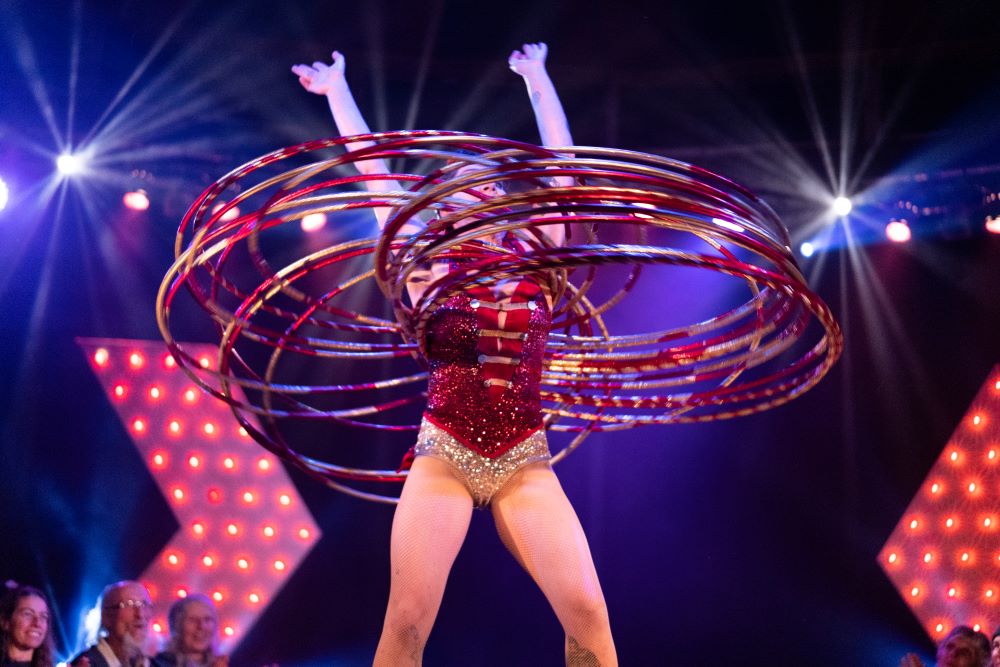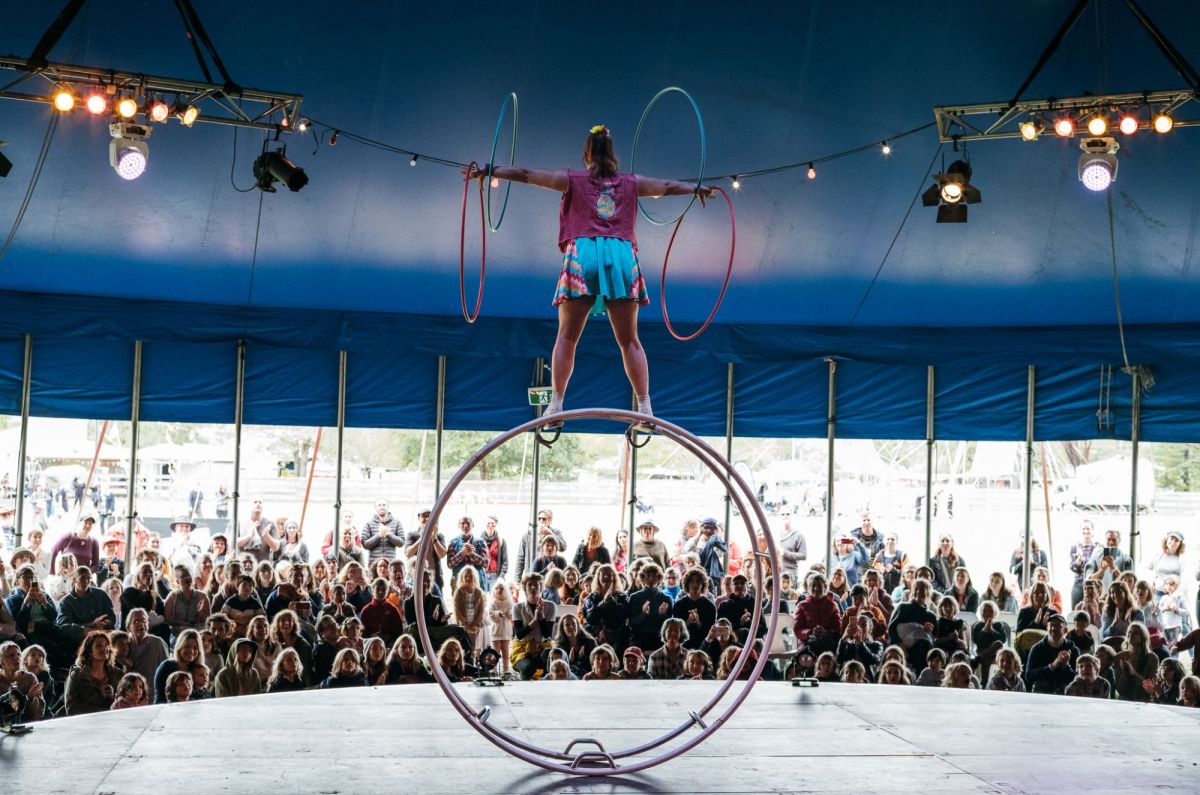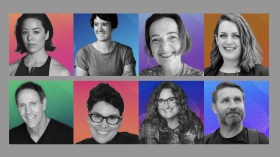Originating in Tasmania in the 1990s as the brainchild of circus artist Tony Rooke, the National Circus Festival is a biennial gathering of the Australian circus community held in Mullumbimby, in the Northern Rivers region of NSW.
Hosted by Spaghetti Circus, one of the country’s leading youth circuses, the Festival presents a three-day public program, which this year includes international guests Snatch Circus from Belfast, as well as companies such as Brisbane’s Casus Circus, Western Australia’s all-women Yuck Circus and Melbourne’s Throw Catch Collective.
‘Spaghetti Circus is very much a regional centre of circus and is all about community,’ says Festival Director and General Manager of Spaghetti Circus, Alice Cadwell.
Sure to be a highlight of this year’s National Circus Festival is Spaghetti Circus’ own production, Monumental 2.0, reimagined in-the-round for a Big Top audience with new cast members joining the ensemble of 11- to 19-year-olds, and an original live score created by Musical Director and local violinist Sue Simpson (Gurrumul, Circus Oz, Midnight Oil) joined by Harry James Angus (The Cat Empire).
‘Our vision at Spaghetti Circus is about creating amazing, empowered, creative, confident, healthy kids,’ says Cadwell. ‘That vision of Spaghetti Circus really runs through the Festival, and that matriarchal culture about community first and kids first is central to everything we do.’
Regional challenges and opportunities
Operating regionally is not without its challenges, as Cadwell is quick to acknowledge. ‘The fact that it’s so far for reviewers to travel to see our work in the regions, and also for grant assessors to come and assess our work because they need to physically travel, is definitely a big challenge,’ she tells ArtsHub.
‘But distance in regional work is also a really great opportunity. What I see as the beauty of regional work is that it is often born of community – so, yes, it’s about creating great pieces of work, but it’s actually about creating community and great humans. So for us, it’s about creating great young people who go on to have careers that may be in circus, but also may be other fields, where they really get to use that creativity and expression and joy that they found here to create great things in their lives.’
Training sparks future circus collaborations
One of the most important elements of the National Circus Festival – held in the lead-up to the public program – is the National Training Program, which this year runs from Sunday 29 September until Thursday 3 October.
The five-day National Training Program began as a collective opportunity for circus artists to ‘create and learn circus together, and it’s still everyone’s favourite [part of the Festival],’ Cadwell says.
‘It’s an incubator of circus, but it’s also the breeding ground of so many collaborations,’ she explains, pointing to the ongoing creative partnership between Adelaide’s Gravity and Other Myths and that company’s director, Darcy Grant (a founding member of Circa who now lives in the Northern Rivers region) by way of example.
‘So there are these amazing little tiny sparks that start at the Training Program, but then go on to have longer-term future impacts,’ Cadwell tells ArtsHub.
The mix of artists participating in the National Training Program is also an important aspect of its success, she continues.
‘There are 50 artists who come to teach during the Training Program and 150 participants, and the mix is one-third young people and two-thirds adults, and that’s been a really important mix for us. Because, yes, we are a youth circus, we love youth circus and that’s our focus at Spaghetti Circus, but the fact that the Training Program has such a large component of adults participating and collaborating and creating together, there’s a really lovely balance with the young people really looking up to those adults and really wanting to work hard alongside them. So there’s a great collaboration,’ Cadwell tells ArtsHub.
Read: International views on Australian circus
Secondments from the National Institute of Circus Arts (NICA), with which the Festival partners, are another key part of the National Training Program, with seconded students given areas of responsibility to focus on during their time in Mullumbimby. Such opportunities add to their training and strengthen their networks and friendships in the circus sector, again helping enrich the sector overall.
Just a handful of tickets remain for the National Training Program at the time of writing, though Cadwell stresses that Festival volunteers are also welcome, an opportunity that allows even more people to witness new circus works develop literally before their eyes.
‘There are over 100 workshops over those five days from 50 teaching artists, but the nightly cabarets are where fresh, new and raw work is experimented [with, and presented] each night. We also all eat meals together – sitting down and eating together is such a strong part of the matriarchal culture at Spaghetti Circus, so we eat together every day. And there are also nightly bar talks during the Training Program, where the industry comes together to talk about the conversations we need to have, but also to hear inspiring talks.’

The matriarchal culture of Spaghetti Circus also extends to taking care of all the children on-site.
‘Our Circus Grommets program [is] for the artists’ and trainers’ kids; we give kids aged six to 13 their own program, and then we also have an on-site Carny Kids Preschool … so that while everyone’s working and training, everyone in the family is looked after, and that’s a really important part of our ethos,’ Cadwell says.
In light of the number of festivals to have recently announced their cancellation or closure (with Mullumbimby’s neighbouring Byron Bay Bluesfest being the latest casualty), supporting smaller, more community-focused festivals has perhaps become a greater priority for people, Cadwell suggests.
‘With the bigger festivals winding up or closing down, these smaller, grassroots festivals are needed more than ever, because they’re a chance for the community to connect and they have really lasting economic benefits, as well as social and mental health benefits,’ she says.
A celebration of community and joy
In light of the ongoing cost of living crisis, which is impacting artists and arts organisations around the country, the National Circus Festival team have strived to ensure that tickets this year are accessibly priced.
‘We’re really seeing that people are worried about ticket sales, but we’re finding that everyone still really wants to come to the circus and enjoy the circus, and so we’ve made sure to keep tickets really affordable,’ says Cadwell.
‘We’re noticing that’s making a real difference with the local community, who are snapping tickets up.
‘And I think that’s because people still want joy, connection and community – in fact, I think in the Great Depression, they say that circus was one of the only thriving industries, because people still wanted joy, and that’s what we’re finding right now. We’re getting lots of feedback about just how much people are excited by community celebration, coming together, passion and joy.’
The National Circus Festival runs from 4-6 October 2024, preceded by the National Training Program from 29 September – 3 October. Visit the National Circus Festival for details.






